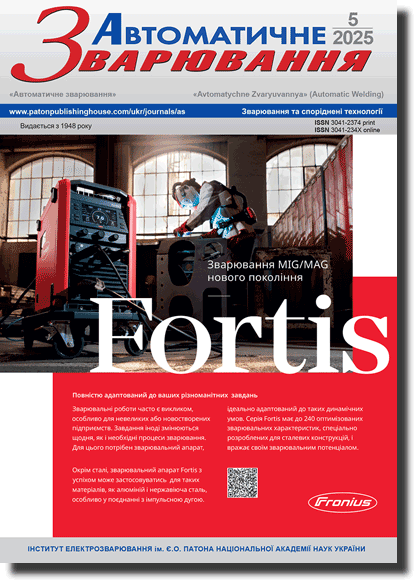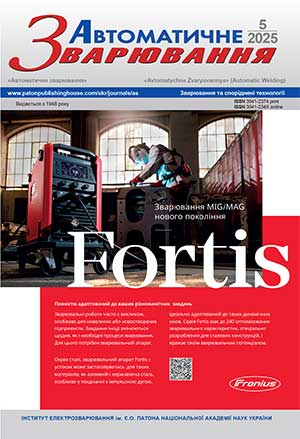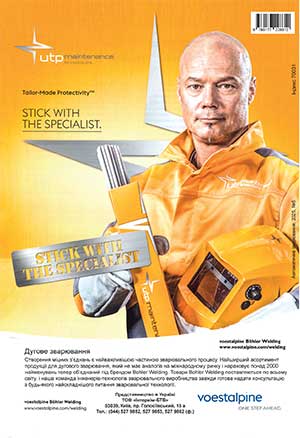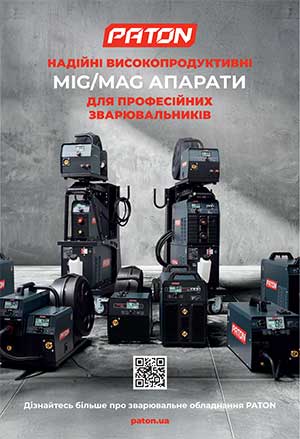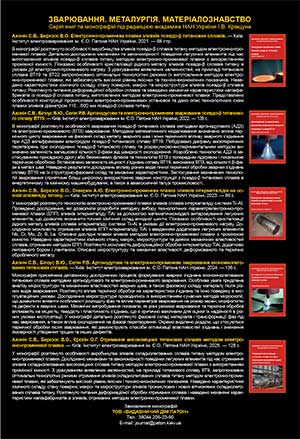| 2025 №05 (01) |
DOI of Article 10.37434/as2025.05.02 |
2025 №05 (03) |
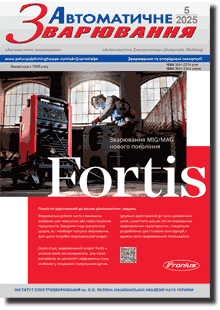
"Avtomatychne Zvaryuvannya" (Automatic Welding), #5, 2024, pp. 16-24
Residual stresses in the joint of the collector to the DN1200 branch pipe of the PGV-1000 steam generator due to local heat treatment
O.V. Makhnenko, O.F. Muzhichenko, I.I. Prudkiy, N.R. Basistyk
E.O. Paton Electric Welding Institute of the NAS of Ukraine 11 Kazymyr Malevych Str., 03150, Kyiv, Ukraine. E-mail: makhnenko@paton.kiev.uaWhen assessing the extension of the service life of WWER-1000 NPP power units, the welded joint of the collector to the DN1200 branch pipe of the PGV-1000 steam generator is an object of increased attention due to its tendency to the formation of discontinuity defects. In order to obtain more detailed information regarding the loading of this welded joint, mathematical modeling of the kinetics of formation of residual stresses and plastic strains, as a result of local postweld heat treatment in the high-temperature tempering mode, was carried out using the finite element method. The complex geometry of the joint and the local arrangement of the heaters cause significant nonuniformity of heating during heat treatment, which can lead to negative consequences, namely, formation of high residual tensile stresses in the hazardous zones of the welded joint. It is proven that the axisymmetric 2D finite element model of the joint with the shortest length of the DN1200 branch pipe provides sufficient conservativeness of the results compared to the general 3D model. 18 Ref., 1 Tabl., 11 Fig.
Keywords: PGV-1000 steam generator, welded joint No. 111, local heat treatment, residual stresses, plastic strains, mathematical modeling, creep
Received: 27.02.2025
Received in revised form: 21.03.2025
Accepted: 15.09.2025
References
1. Voyevodin, V.N., Ozhigov, L.S., Mitrofanov, A.S., Shramchenko, S.V., Krainyuk, Y.A. (2014) Identification of defects in the welded joint metal of the case of steam generator to the collector on the WWER-1000. Voprosy Atomnoi Nauki i Tekhniki, 4(92), 82-87 [in Russian].2. Dub, A.V., Durynin, V.A., Razygraev, A.N., Razygraev, N.P. et al. (2014) Development of ultrasonic control techniques and determination of operability of the collector welding unit to the PGV-1000M steam generator. Tekh. Diagnost. i Nerazrush. Kontrol, 4, 36-51 [in Russian].
3. Kharchenko, V.V., Chirkov, A.Yu., Kobel'skii, S.V., Kravchenko, V.I. (2017) Improving the computational analysis of stress-strain state and fracture resistance of welded joints between coolant headers and PGV-1000M steam generator vessel of nuclear power station. Strength of Materials, 49, 349-360. https://doi.org/10.1007/s11223-017-9875-3
4. Makhnenko, V.I., Markashova, L.I., Makhnenko, O.V. et al. (2012) Growth of corrosion cracks in structural steel 10GN2MFA. The Paton Welding J., 8, 2-5.
5. Makhnenko, V.I. (2006) Safe service life of welded joints and assemblies of modern structures. Kyiv, Naukova Dumka [in Russian].
6. Stepanov, G.V., Shirokov, A.V. (2014) Assessment of the kinetics of crack propagation in the header-steam generator connector welded joint No. 111 by plasticity resource. Strength of Materials, 46, 375-382. https://doi.org/10.1007/s11223-014-9559-1
7. Stepanov, G.V., Kharchenko, V.V., Babutskii, A.I. et al. (2003) Stress-strain state evaluation of a welded joint of hot collector to nozzle of NPP steam generator PGV- 1000. Strength of Materials, 35, 536-544. https://doi.org/10.1023/B:STOM.0000004543.31528.98
8. Kharchenko, V.V., Stepanov, G.V., Kravchenko, V.I. et al. (2009) Redistribution of stresses in the header-PGV-1000 steam generator connector weldment under loading after thermal treatment. Strength of Materials, 41, 251-256. https://doi.org/10.1007/s11223-009-9130-7
9. Khodakovskii, A.A., Chirkov, A.Yu., Kharchenko, V.V. (2013) Calculation analysis of the stress-strain state of the collector-to-nozzle weld in the steam generator under seismic loading. Strength of Materials, 45, 482-488. https://doi.org/10.1007/s11223-013-9483-9
10. Banko, S. (2012) Stressed state of the collector-case connection unit of the PGV-1000M steam generator with a cavity. Visnyk Ternopilskoho NTU, 67(3), 56-63 [in Ukrainian].
11. Stepanov, G.V., Kharchenko, V.V., Babutskii, A.I. (2006) Stressstrain state of the header-steam generator connector weldment induced by local thermal treatment. Strength of Materials, 38, 595-600. https://doi.org/10.1007/s11223-006-0081-y
12. Muzhychenko, O.F., Makhnenko, O.V. (2019) Mathematical modeling of residual stresses in the collector to nozzle Du1200 welding unit of steam generators PGV-1000. In: Proc.Papers of the Intern. Conf. on Innovative Technologies and Engineering in Welding and Related Processes PolyWeld 2019, May 23-24, 2019, Kyiv, 82-83.
13. Makhnenko, O.V., Milenin, O.S., Muzhychenko, O.F. et al. (2023) Mathematical modeling of residual stress relaxation during performance of postweld heat treatment. The Paton Welding J., 6, 32-40. https://doi.org/10.37434/tpwj2023.06.05
14. (2015) ASTM E837-13a. Standard Test Method for Determining Residual Stresses by the Hole-Drilling Strain-Gage Method. ASTM International.
15. Lobanov, L., Pivtorak, V., Savitsky, V., Tkachuk, G. (2014) Technology and equipment for determination of residual stresses in welded structures based on the application of electron speckle- interferometry. Mat. Sci. Forum, 768-769, 166-173. https://doi.org/10.4028/www.scientific.net/MSF.768-769.166
16. Rogante, M. (2020) Inside welds: Advanced characterization of residual stresses by neutron diffraction. The Paton Welding J., 11, 18-24. https://doi.org/10.37434/tpwj2020.11.04
17. Senchenkov, I.K., Chervinko, O.P., Banyas, M.V. (2013) Modeling of thermomechanical process in growing viscoplastic bodies with accounting of microstructural transformation: Encyclopedia of Thermal Stresses. Springer Ref., Vol. 6, 3147-3157. https://doi.org/10.1007/978-94-007-2739-7_618
18. Hrivnak, I. (1984) Weldability of steels. Ed. by E.L. Makarov. Moscow, Mashinostroenie [in Russian].
Advertising in this issue:
To order the electronic version of the paper:
O.V. Makhnenko, O.F. Muzhichenko, I.I. Prudkiy, N.R. BasistykResidual stresses in the joint of the collector to the DN1200 branch pipe of the PGV-1000 steam generator due to local heat treatment
Automatic Welding №05 2025 p.16-24
The cost of article (pdf): 13 $, 12 €, 150 UAH (1 copy. )
fill in the form below:
The cost of subscription/purchase order journals or individual articles
| Journal/Currency | Annual Set | 1 issue printed |
1 issue |
one article |
| TPWJ/USD | 384 $ | 32 $ | 26 $ | 13 $ |
| TPWJ/EUR | 348 € | 29 € | 24 € | 12 € |
| TPWJ/UAH | 7200 UAH | 600 UAH | 600 UAH | 280 UAH |
| AS/UAH | 1800 UAH | 300 UAH | 300 UAH | 150 UAH |
| AS/USD | 192 $ | 32 $ | 26 $ | 13 $ |
| AS/EUR | 180 € | 30 € | 25 € | 12 € |
| SEM/UAH | 1200 UAH | 300 UAH | 300 UAH | 150 UAH |
| SEM/USD | 128 $ | 32 $ | 26 $ | 13 $ |
| SEM/EUR | 120 € | 30 € | 25 € | 12 € |
| TDNK/UAH | 1200 UAH | 300 UAH | 300 UAH | 150 UAH |
| TDNK/USD | 128 $ | 32 $ | 26 $ | 13 $ |
| TDNK/EUR | 120 € | 30 € | 25 € | 15 € |
AS = «Automatic Welding» - 6 issues per year;
TPWJ = «PATON WELDING JOURNAL» - 12 issues per year;
SEM = «Electrometallurgy Today» - 4 issues per year;
TDNK = «Technical Diagnostics and Non-Destructive Testing» - 4 issues per year.





